Lion’s Mane has been shown to reduce mild symptoms of both anxiety and depression.1 Unlike prescribed anti-depressants or other psychoactive drugs, there is no risk of becoming addicted or physically dependent on lion’s mane.
What is Lion’s Mane?
Lion’s Mane, also known as Yamabushitake, is a dietary mushroom that has long been used in traditional Chinese medicine and cuisine. Lion’s mane gets its name from the clear resemblance of an actual lion’s mane, as you can see from the image above!
Lion's mane is known to contain many bioactive compounds that have beneficial effects on the body, hence its use in traditional Chinese medicine.
But it isn't just traditional medicine which has found benefits from lion's mane mushroom consumption. Recent clinical studies have shown that lion's mane mushroom does produce significant, measurable improvements in several aspects of brain health, cognitive performance, and overall health.
Due to these many benefits, you often find lion’s mane used as an ingredient in top nootropics, such as our very own Mind Lab Pro, the world's most complete nootropic formula.
So what are the benefits of lion's mane mushroom? And should you be aware of any possible side effects of lion’s mane? Is lion's mane mushroom addictive?
Read on and we will answer all these questions and more!
What Are The Health Benefits of Lion’s Mane?
-
Improves cognitive function
Lion’s mane supplies active nootropics called hericenones and erinacines, stimulating the synthesis of nerve growth factor (NGF), which in turn promotes overall brain health.
-
Immune modulating and antioxidant properties
Lion’s mane is known to have immune-regulating and antioxidant properties that may support health.
-
Help for digestive ulcers
In one in vitro study, it was found that lion’s mane reduced the growth of H. pylori, bacteria that, when overgrown, can be one of the causing factors of stomach ulcers.2
-
Mood and anxiolytic properties
One study found that lion’s mane helped ease mild symptoms of anxiety and depression, as well as possible improvements in sleep quality.3
-
Help with menopausal symptoms
Menopausal women have found that the daily consumption of lion’s mane for one month helped reduce feelings of irritation and anxiety associated with menopause.4
What Is The Optimal Dose of Lion’s Mane?
As research is still in the preliminary stages, an optimal dose for lion's mane has not been confirmed. However, 500-1000mg appears to be an effective dose.
Lion’s mane can be eaten in raw or cooked form, but is also a key ingredient in some nootropic formulas.
So, if you find yourself wanting to boost your mental performance and optimize your brainpower, lion’s mane is best taken alongside other powerful nootropics!
Are There Any Side Effects of Lion’s Mane?
There are no reported side effects of lion’s mane, unless you have an allergy to mushrooms. Though as with any new supplement, it’s best to consult your doctor before taking it!
Conclusion: Can Lion's Mane Mushroom Be Addictive?
Lion’s mane mushroom appears to be a highly effective nootropic, providing lasting benefits to memory, focus, learning, and potentially mood. It is particularly useful if you’re seeking to reap the brain-boosting benefits with minimal side effects.
More importantly, the benefits of lion's mane mushroom supplementation are long-lasting. When used on a daily basis for periods of several weeks and months, lion's mane mushroom extracts have been found to produce significant improvements in cognitive function which last long after you stop taking the nootropic.
As far as addiction goes, there is nothing to worry about with lion's mane mushroom.
Whether you want to take it as a powerful nootropic or to help ease your symptoms of anxiety and depression, you are at no risk of becoming addicted or physically dependant!
Related Post : Are Nootropics Addictive?
References
- K. Patel. Lion’s Mane. Examine.com. 2021
- Jiang S, Wang S, Sun Y, Zhang Q. Medicinal properties of Hericium erinaceus and its potential to formulate novel mushroom-based pharmaceuticals. Appl Microbiol Biotechnol. 2014 Sep;98(18):7661-70
- K. Patel. Lion’s Mane. Examine.com. 2021

